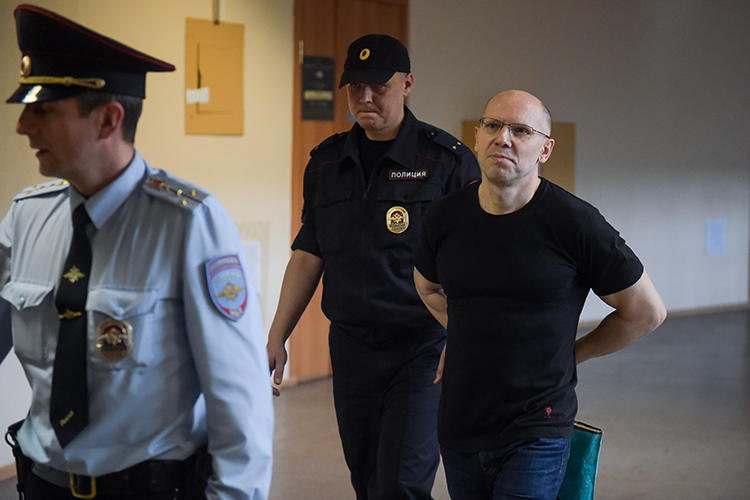Igor Rudnikov is the editor-in-chief of the independent Novye Kolyosa newspaper, based in the western Russian city of Kaliningrad. In 2017, agents from Russia’s Federal Security Service (FSB) arrested Rudnikov over his paper’s reporting, as CPJ documented at the time.
He was released last year after an international outcry, but has continued to face harassment from local authorities, he told CPJ.
Following his release, the newspaper’s equipment was returned and its bank accounts unfrozen, but Rudnikov says authorities still prohibit him from spending the publication’s funds, and said that Kaliningrad’s central district court canceled Novye Kolyosa’s registration in early February.
The future is uncertain as the newspaper fights with local officials to survive, as Rudnikov told CPJ in a phone interview on March 25. His replies have been edited for length and clarity.
Will you appeal the court’s decision to cancel Novye Kolyosa’s registration?
Of course, we will appeal this decision at a higher court. Novye Kolyosa has already been around for 25 years. This is the authorities’ tenth attempt to close us. We won six times and lost the other four battles. After every defeat, Novye Kolyosa managed to resurrect itself under a slightly different name. I am sure we will survive again, and win this case too.
But our survival depends on the money we get. The coronavirus makes everything more challenging. A month ago, a new edition of the newspaper was printed in Moscow and transported to Kaliningrad. It took us seven days and cost about $1,000. The circulation was 100,000 copies. We had to print in Moscow because all publishing houses in Kaliningrad refused to print Novye Kolyosa.
Now, with the quarantine, crossing the borders is banned, printing the paper elsewhere is not an option. We have an internet edition only.
Why isn’t it possible to print the paper in Kaliningrad?
We are very critical of Kaliningrad Governor Anton Alikhanov and his administration. He has created a kind of totalitarian kingdom in Kaliningrad. Formally, he is just an official, but he has everything in his hands and can put pressure on every business here. I am sure that the publishing houses are being given orders not to publish Novye Kolyosa. The officials have denied it and said the reason is economic only. But it is a purely political matter. The authorities are angry because we disclose violations of human rights and corruption in the region and we do it in a straightforward manner.
The governor did everything to put me behind bars in 2017, and I spent 592 days in jail. They accused me of accepting bribes from Viktor Ledenyov, the head of the Kaliningrad branch of Russia’s Investigative Committee. It has turned out to be a false accusation but I was in jail.
I was hospitalized for a concussion and broken rib after being questioned by security service agents [during the 2017 arrest]. Then they admitted they made a mistake and I was released. Businessmen and political figures in Kaliningrad have told me that Alikhanov keeps telling that he will find means to put me back in jail. We will see.
What do you say to those in Kaliningrad who allege that you write in an accusatory manner and do not give officials an opportunity to present their point of view in your paper?
I do not care about that kind of opinion. I believe the main point is telling the truth. In our case, journalism is a critique of authorities, of officials who think they can do everything they want. It is not true that our newspaper presents only one point of view. Usually, when we reach out to officials, they refuse to comment, to present their point of view. We end up publishing only one side’s opinion, publishing the results of our investigations.
How do you plan to continue?
I sold my apartment to get money to keep Novye Kolyosa alive. It will suffice for a year. If it continues like that, we will have to shut down the newspaper. We continue fighting. I have called on the prosecutor’s office to investigate how the money was spent building an oncological hospital in Kaliningrad. I have facts, concrete facts, that the money was stolen by officials. I badly want the case to be investigated as it may put an end to at least one corruption case. Those guilty should go to jail.
How else has the coronavirus affected your work?
The pandemic affects Novye Kolyosa like it affects everything else. Officially, there have been five confirmed cases of coronavirus in the Kaliningrad region. But I do not trust these figures. I remember Chernobyl, when [then-Soviet] authorities tried to hide the truth. Now, they want to adopt new laws on “fake news.” The laws will punish media outlets seeking to provide objective information. I am afraid that under the pretext of ensuring public safety amid the coronavirus outbreak, the authorities will crush independent media completely.
[Editors’ Note: CPJ called Anton Alikhanov, but he refused to comment, as did his press officer Dmitri Lyskov. CPJ called the local printing house that printed Novye Kolyosa in the past, but nobody answered the phone.]
